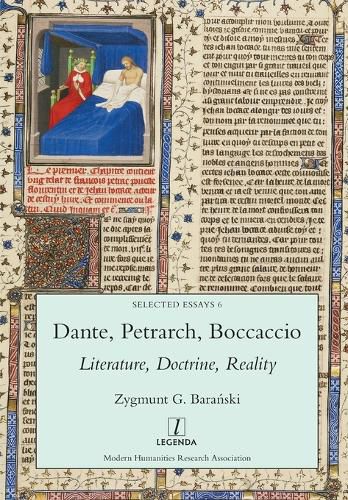Readings Newsletter
Become a Readings Member to make your shopping experience even easier.
Sign in or sign up for free!
You’re not far away from qualifying for FREE standard shipping within Australia
You’ve qualified for FREE standard shipping within Australia
The cart is loading…






This title is printed to order. This book may have been self-published. If so, we cannot guarantee the quality of the content. In the main most books will have gone through the editing process however some may not. We therefore suggest that you be aware of this before ordering this book. If in doubt check either the author or publisher’s details as we are unable to accept any returns unless they are faulty. Please contact us if you have any questions.
Dante, Petrarch, and Boccaccio, the three crowns of Italian literature, dealt with literature, doctrine, and reality in distinct, yet also overlapping, ways. In this major collection of nineteen essays, Baranski explores how they endeavoured to create and establish their authority and identity as writers, while developing new ideas about literature and its status in the world, and, especially in Dante’s case, forging and legitimating new forms of writing. Each treated other authors, such as Guido Cavalcanti, or intellectuals, such as Epicurus, polemically and selectively as foils to their own self-portraits. Petrarch and Boccaccio had also to contend with Dante, and his extraordinary success as a ‘modern’ vernacular authority, though they employed very different strategies for doing so. Baranski’s close attention to the medieval context uniting these greatest of medieval writers is complemented by an equally close attention to the scholarly tradition on the questions addressed. To be a historian of literature also means being a historian of one’s subject.
Zygmunt G. Baranski is Serena Professor of Italian Emeritus at the University of Cambridge and Notre Dame Professor of Dante & Italian Studies at the University of Notre Dame. He has published extensively on Dante, on medieval Italian literature, on Dante’s fourteenth- and twentieth-century reception, and on twentieth-century Italian literature, film, and culture. For many years he was senior editor of The Italianist, and currently holds the same position with Le tre corone.
$9.00 standard shipping within Australia
FREE standard shipping within Australia for orders over $100.00
Express & International shipping calculated at checkout
This title is printed to order. This book may have been self-published. If so, we cannot guarantee the quality of the content. In the main most books will have gone through the editing process however some may not. We therefore suggest that you be aware of this before ordering this book. If in doubt check either the author or publisher’s details as we are unable to accept any returns unless they are faulty. Please contact us if you have any questions.
Dante, Petrarch, and Boccaccio, the three crowns of Italian literature, dealt with literature, doctrine, and reality in distinct, yet also overlapping, ways. In this major collection of nineteen essays, Baranski explores how they endeavoured to create and establish their authority and identity as writers, while developing new ideas about literature and its status in the world, and, especially in Dante’s case, forging and legitimating new forms of writing. Each treated other authors, such as Guido Cavalcanti, or intellectuals, such as Epicurus, polemically and selectively as foils to their own self-portraits. Petrarch and Boccaccio had also to contend with Dante, and his extraordinary success as a ‘modern’ vernacular authority, though they employed very different strategies for doing so. Baranski’s close attention to the medieval context uniting these greatest of medieval writers is complemented by an equally close attention to the scholarly tradition on the questions addressed. To be a historian of literature also means being a historian of one’s subject.
Zygmunt G. Baranski is Serena Professor of Italian Emeritus at the University of Cambridge and Notre Dame Professor of Dante & Italian Studies at the University of Notre Dame. He has published extensively on Dante, on medieval Italian literature, on Dante’s fourteenth- and twentieth-century reception, and on twentieth-century Italian literature, film, and culture. For many years he was senior editor of The Italianist, and currently holds the same position with Le tre corone.